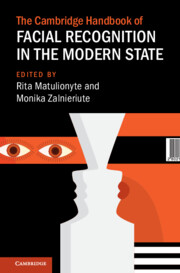The Cambridge Handbook of Facial Recognition in the Modern State
In situations ranging from border control to policing and welfare, governments are using automated facial recognition technology (FRT) to collect taxes, prevent crime, police cities, and control immigration. FRT involves the processing of a person’s facial image, usually for identification, categorisation, or counting. This ambitious handbook brings together a diverse group of legal, computer, communications, and social and political science scholars to shed light on how FRT has been developed, used by public authorities, and regulated in different jurisdictions across five continents. Informed by their experiences working on FRT across the globe, chapter authors analyse the increasing deployment of FRT in public and private life. The collection argues for the passage of new laws, rules, frameworks, and approaches to prevent harms of FRT in the modern state and advances the debate on scrutiny of power and accountability of public authorities which use FRT. This book is also available as Open Access on Cambridge Core.
Rita Matulionyte is an associate professor at Macquarie University Law School and a senior fellow at the Lithuanian Centre for Social Sciences. An international expert in intellectual property and technology law, she has published over sixty papers in the field and co-authored commissioned reports to the European Patent Office and the governments of South Korea and Australia.
Monika Zalnieriute is a senior lecturer (associate professor) at the University of New South Wales, Sydney; and a senior fellow at the Lithuanian Centre for Social Sciences. Her research on law and technology has been translated to German, Russian and Mandarin, and is widely drawn upon by scholars and organisations such as the Council of Europe, the World Bank, the European Parliament, and WHO. She is the co-editor of Money, Power and AI (Cambridge, 2023).

